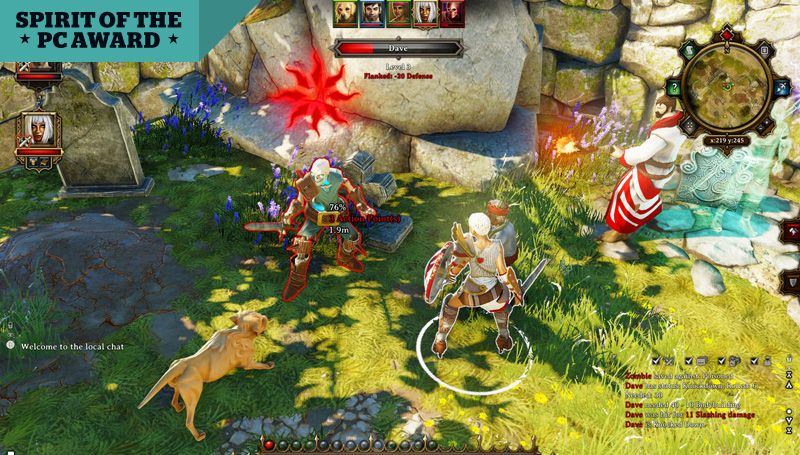
Check out our game of the year awards 2014 page to find out how the awards were decided.
Chris Thrusten: The funny thing about Divinity is that it’s a throwback to a classic form of the genre that nonetheless feels like it’s from the future. Its big new ideas are part of that—two protagonists, you controlling both; campaign-wide co-op; a complex combat system grounded in emergent interactions—but the crucial thing is the sense of freedom that complexity gives you. It’s not afraid to let you break things, or try. It gives you ownership over your experience.
It’s this that makes it feel a lot like playing a pen and paper RPG with a good game master, something most RPGs shoot for but few achieve. It’s notable that this creates a game that is, fundamentally, funny—its attempts at drama don’t really stick, but the humour does, and that’s because humour is a natural complement to freedom of this kind. Most pen and paper RPGs I’ve played have ended up making me laugh one way or another, because that’s the natural sideeffect of sitting in a room playing and improvising with your friends. Original Sin has that feel to it.
That feeling is compounded by the range of tools available to build and run your own multiplayer sessions, and in the sheer time investment required to get everything out of the game. This is an RPG that can still surprise you after many hours simply by virtue of its core design, rather than some left-field plot twist or BioWare-style escalation in the stakes. It’s not a game that’s likely to make you cry—we’ve got Inquisition for that—but it is the one that will make you feel a whole host of other emotions, including ‘why did I just electrocute my own wizard’ and ‘what happens if I blow up the mayor’. Those are totally real emotions, by the way. Yep.
Tom Marks: I’ve spent almost every weekend of the past four months playing this. I’ve played over 80 hours and every minute has been co-op with the same person. It’s a game designed from the ground up with co-op in mind, and that has created interactions unexpected and exciting. When playing alone, you’re often presented with the option to disagree with yourself. Those moments help define your characters’ personalities and are mostly for show, but when playing with my girlfriend—who sits five feet away from me—we can discuss the choice we want to make before selecting our answers. A plan that often falls apart as we determine the best choice out loud before one of us secretly changes their mind and puts their character at odds with the other.
Divinity is the kind of game that I would normally get lost in, using it as an escape to another world. But, fundamentally, it pushed me to invite another human being into that experience. Fortunately for me, I really like the human being I chose to play it with, and the game became our escape rather than just mine. Working together isn’t forced upon us by the game, it’s just naturally what we want to do and makes every decision we make together—or argue about—feel completely within our control. At nearly 100 hours long, it asks a lot of those who choose to play together, but playing Divinity that way is an incredibly rewarding experience, both in and out of the game.
For our full verdict read our Divinity: Original Sin review.
The biggest gaming news, reviews and hardware deals
Keep up to date with the most important stories and the best deals, as picked by the PC Gamer team.

It's Christmas. Would you like a free game? Of course you would! Thanks to our friends at Playfire, you can get a free Steam key right now. Follow the link for full details.
PC Gamer is the global authority on PC games—starting in 1993 with the magazine, and then in 2010 with this website you're currently reading. We have writers across the US, Canada, UK and Australia, who you can read about here.


